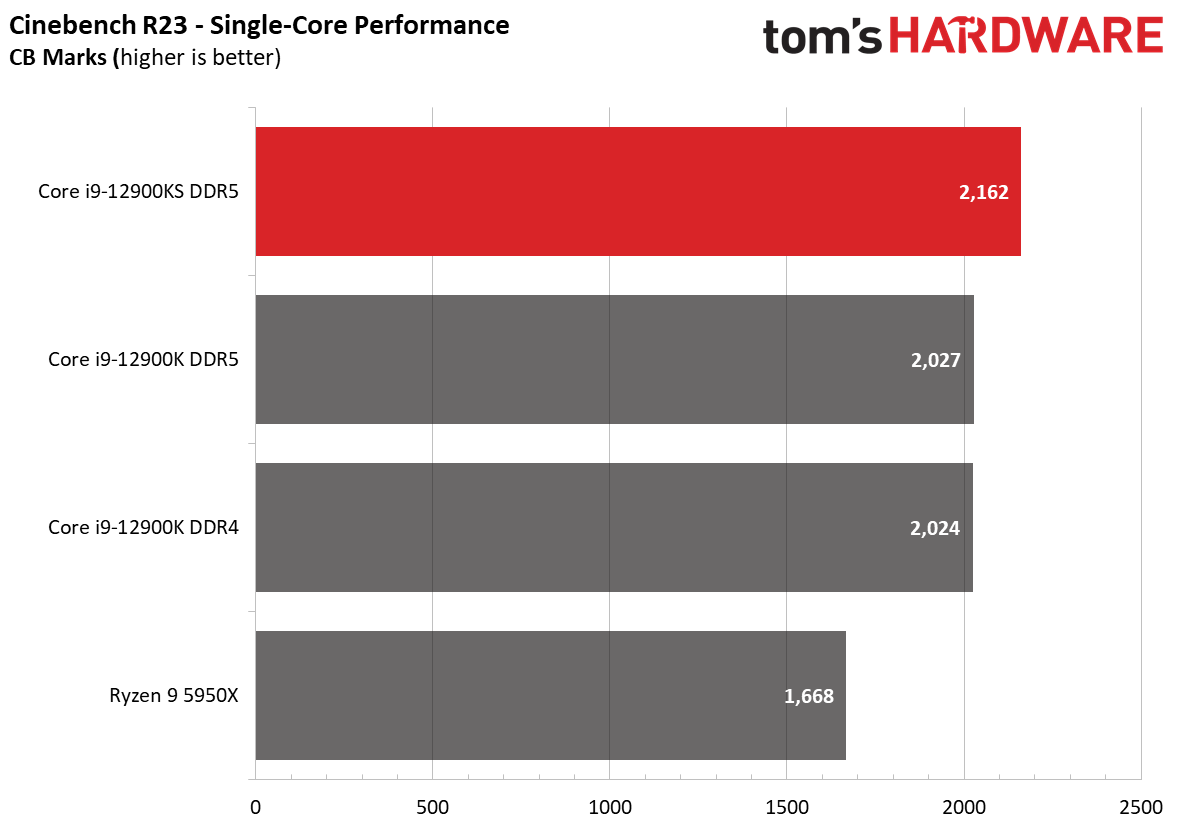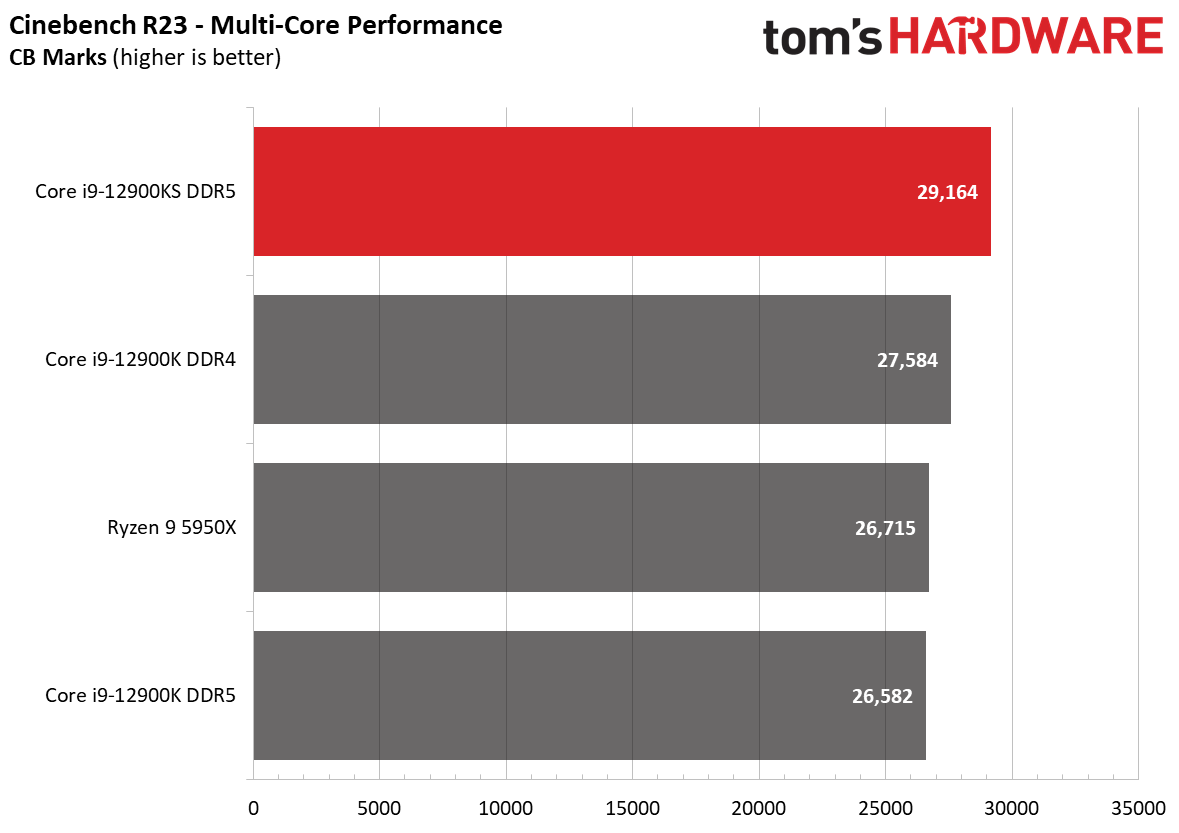Core i9-12900KS Takes 9% Cinebench R23 Multi-Core Lead Over 5950X
Intel's cherry-picked Core i9-12900KS, which will challenge the best CPUs, isn't officially out yet. However, some retailers have jumped the gun and shipped the special edition Alder Lake chip to customers. Reddit user Seby9123 was one of the lucky ones that got a Core i9-12900KS before everyone else, and they put it through Cinebench R23.
The Core i9-12900KS will offer the same cores as the regular Core i9-12900K. However, the Alder Lake processor's most considerable appeal comes in the shape of its higher clock speeds. In a nutshell, consumers are receiving a 200 MHz higher base and boost clock over the Core i9-12900K. The Redditor confirmed the Core i9-12900K's behavior in the Cinebench R23 runs, where the 16-core chip had two of its P-cores boosted to 5.5 GHz and the rest to 5.2 GHz. The E-cores, on the other hand, maxed out at 4 GHz.
Cinebench R23 is part of our CPU test suite, allowing us to compare our existing data for other processors to the Redditor's Core i9-12900KS results. However, the user used DDR5-6200 at 32-38-38-76, whereas our DDR5 platform revolved around DDR5-4400 with timings set at 36-36-36-72. So, the Redditor had the upper hand since their system had faster memory. On the other hand, our DDR4 platform utilized DDR4-3200 with 14-14-14-36 timings. The Redditor tested on Windows 10, so we used our Windows 10 results for comparison.


The Core i9-12900KS exhibited a 6.7% higher single-core performance than the Core i9-12900K (DDR5). The Intel chip also outperformed the Ryzen 9 5950X by 29.6%. In addition, the Cinebench R23 margins are slightly higher than the previously leaked Geekbench 5 submissions. In terms of multi-core performance, the Core i9-12900KS was head of the Core i9-12900K by 5.7% and outpaced the Ryzen 9 5950X by 9.2%.
It remains to be seen whether the Core i9-12900KS will offer noticeable improvements in real-world workloads but, more importantly, in gaming. When Intel first showed off the Core i9-12900KS, the chipmaker confirmed that it would ship the special edition Alder Lake chip by the end of this quarter. Now that AMD has confirmed the launch date for the Ryzen 7 5800X3D to April 20, the Core i9-12900KS shouldn't be far behind.
Get Tom's Hardware's best news and in-depth reviews, straight to your inbox.

Zhiye Liu is a news editor, memory reviewer, and SSD tester at Tom’s Hardware. Although he loves everything that’s hardware, he has a soft spot for CPUs, GPUs, and RAM.
-
Neilbob There is really no way a 200 MHz increase is going to make a 'noticeable difference' to anything. This is basically just a glorified measuring tool.Reply -
thehadgi Just ran first run of R23 with a 12900k, msi z690i unify, and 32gb ddr5 5600mhz after finishing my build today. hit 27356 on multicore, with a noctua d15, temps riding 100C the whole time. Gonna start looking at overclocking/undervolting and see where it gets meReply
Edit: Apparently my OC skills and knowledge has deteriorated significantly since my sandy bridge days; 100 C appears to be very, very bad. Duh. Gonna try repasting screwing and setting things back to defaults and starting over -
watzupken Intel just wants to win, that’s why they will go all out to get the performance crown back. But in order to get there, this KS version is going to need a lot more power. So while they win at performance, they failed bitterly at power needs. For consumer desktops, power is not that much of a problem. But when you look at enterprise/ data centers, the high power requirement may not make it attractive.Reply -
spongiemaster Reply
The 30% advantage in single core performance is noteworthy. It's unlikely Zen 4 is going to match that. Intel isn't going to releases a 13900k that is slower than that. We can assume Intel's Raptor Lake P-Cores are going to maintain the performance crown for mainstream use. The only question is by how much.watzupken said:Intel just wants to win, that’s why they will go all out to get the performance crown back. But in order to get there, this KS version is going to need a lot more power. So while they win at performance, they failed bitterly at power needs. For consumer desktops, power is not that much of a problem. But when you look at enterprise/ data centers, the high power requirement may not make it attractive.